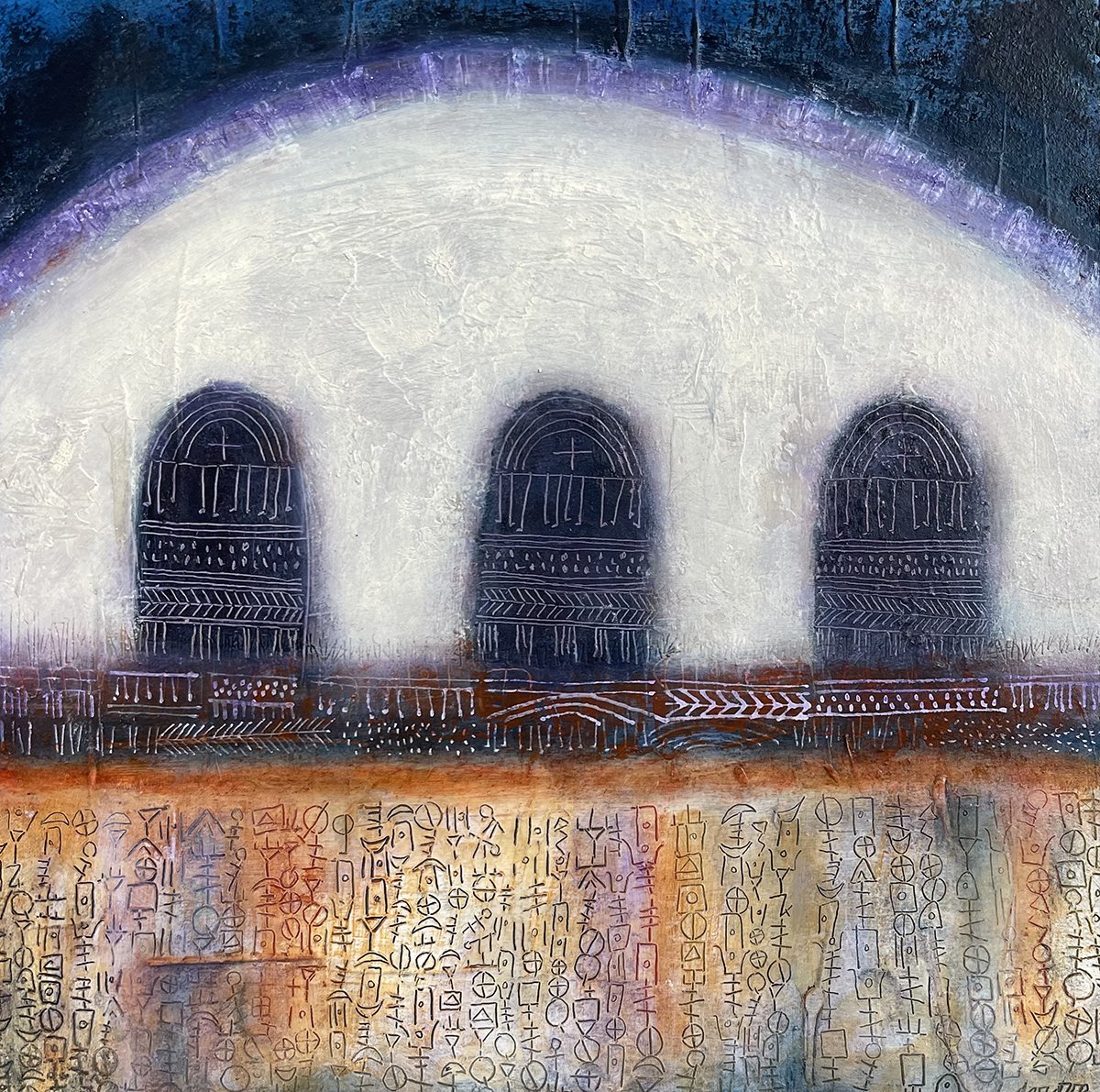“All we have to decide is what to what to do with the time that has been given us.”
— Gandalf in The Fellowship of the Ring, JRR Tolkien
Purple of the Eternal | Oil on wood ©Laurie Doctor
When I discovered this weekend that all the files, the folders, everything I had written, and all the images too had disappeared from my laptop — I thought of the writer who told the story of coming down to her studio one morning after a storm, and saw the rain pouring in through the roof. After some moments of sitting on the stairs with her head in her hands she said to herself: First, I will write. Then I will figure out what to do with this roof. So here I am in my studio, beginning again with pen and paper. I am thinking of the title of my upcoming online class, grain of hope, and all the videos I prepared that have disappeared. This loss coincides in my mind with the growing sense of chaos, dread and danger for our world.
Nonetheless, I am even now beginning to feel restored by turning my attention to the inner world, and writing to you. What is the constant that holds us, the you that remains beneath every change and disaster? How long has the moon been disappearing and re-appearing, while orbiting this earth and witnessing every flood, fire and storm? The scientists estimate 4.5 billion years. The oldest star in our galaxy is estimated at 13.2 billion years. How does one even imagine that kind of time? Has everyone experienced the altered perspective that gazing at a night sky filled with stars gives? Even though I don’t understand what it fully means, just to contemplate that we can point toward the oldest billions-year-old star and say we are made of the same stuff, is astounding. The sense of awe, of wonder, is itself a cure for anxiety. Wonder is restored when I am captured unawares, for example, by the elusive pileated woodpecker who landed just next to me yesterday while I was washing windows.
©Laurie Doctor Sketchbook (sketching on top of a painted page)
This sense of the bigger picture, the feeling of being held, is a kind of faith. I have faith not because of prescribed beliefs, but because of deeply felt experiences of being. My work is rooted in this, and in the conviction of things unseen. This is a necessary and welcome balance to the overwhelming amount of visual and auditory stimulation and information. It is also a comfort when some unwelcome change arrives in one instantaneous moment.
It is the same with any kind of creative work, the best things happen when I shift away from willfulness and look in another direction. There is the sense of giving oneself over to what cannot be understood, to giving oneself over to what is, to giving oneself over. This is what it takes to change focus, to empty oneself of the noise of the world, to become a receiver for what is waiting to come. The world responds when I am wholehearted and fully devoted to the uncertainty of my work and my life.
I have long been influenced by what I have read about the Hopi sense of faith. My understanding is that they have a non-linear sense of time. Instead of past, present and future, there is simply what is unmanifest in your heart — that which is becoming but has not yet arrived — and what is manifest, what has come to be. There is trust in what is becoming. Their sense of faith involves not measuring or judging how long it takes for change to occur. What a powerful idea for our time of instant results. We look at our watches and declare a prayer unanswered. Faith is holding the image in spite of circumstances, of not giving up because of our limitations in thinking in causal, linear time. Everyone can return to another kind of time — the timelessness of moments when we lose ourselves by finding something to adore, to be devoted to, to give our full attention to.
My husband and I have spent our evenings this week reading aloud from W S Merwin’s translation of Dante’s Purgatorio. Many of you know the beloved Buddhist poet, W S Merwin, who we lost just a few years ago. Merwin has rendered this English translation of Dante in the way only another powerful poet could. I had to write some of the phrases down:
The noise the world makes is only a breath
of wind from time to time blowing back and forth,
the name changing according to where it comes from.
— Purgatorio, Canto XI, Lines 100 - 102
When his feet had given up the haste
that mars the dignity of any action,
— Purgatorio, Canto III, Lines 10 – 11
And then later, after trudging many long hours, as Dante is finally getting closer to the mountain, he asks his guide, Virgil, why the walking is feeling so much less difficult, so much more effortless? This is how Virgil responds:
your feet will be overcome so utterly
with goodwill that not only will they not be
weary, but urging them on will make them happy.
— Purgatorio, Canto XII, Lines 124 - 126
This is what I am thinking this morning, that we all need a grain of hope, and that against all reason, we keep urging our feet forward.
Where do you find perspective and comfort? What part of your day or night takes you there? I’d love to hear from you.


